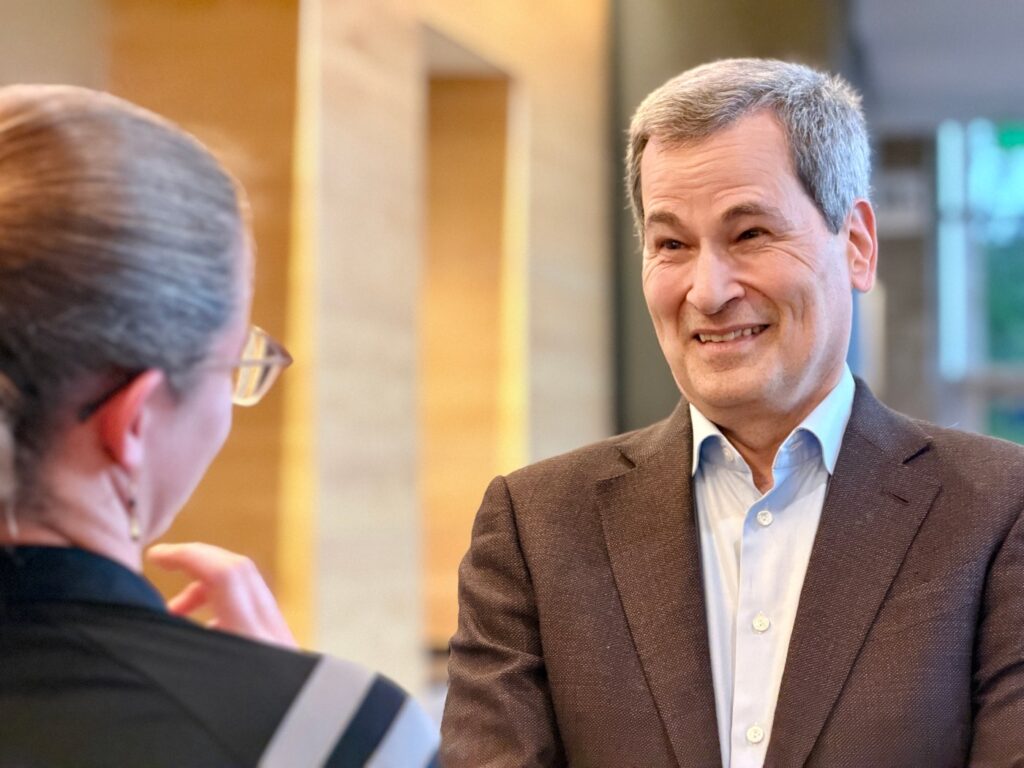
Artificial intelligence (AI) is transforming healthcare, impacting everything from mental health support to drug development. At the recent Purdue University Northwest Sinai Forum on October 26, 2025, science journalist David Pogue highlighted these advancements, noting that AI has become integral to various healthcare functions.
Pogue emphasized the growing role of AI chatbots in mental health care, stating, “ChatGPT is now the single largest provider of mental health in the United States.” During his presentation, he demonstrated the chatbot’s capabilities by simulating a conversation as a depressed individual. The chatbot provided responses, including encouragement to engage in community discussions about AI’s role in society. Pogue showcased its versatility by asking the bot to create a limerick and translate it into Italian, illustrating how AI can serve as both a therapeutic tool and a source of entertainment.
Questions from the audience raised concerns about the responsibilities of AI in crisis situations. Pogue reassured attendees that AI chatbots would be expected to adhere to similar legal standards as human therapists, including reporting imminent threats of violence.
The Role of Wearable Technology in Health Monitoring
Pogue also discussed the potential of wearable devices like Apple Watches and Fitbits, which offer significant health monitoring capabilities. He described these gadgets as “massive biotech-absorbing gadgets” that track vital statistics, including heart rate and sleep patterns. He noted their ability to warn users of health anomalies such as atrial fibrillation, a condition that can lead to strokes if left undetected. “This thing has saved so many lives, hundreds of people a day,” Pogue stated, highlighting the importance of proactive health management.
In a notable example, Pogue mentioned a recent development where Apple Watches can now alert users about potential sleep apnea. He referenced research from Stanford University that examined the capability of smartwatches to identify diseases, including anemia and type 2 diabetes. Pogue suggested that the technology could eventually evolve to detect cancers and predict other health issues.
AI’s Impact on Pharmaceuticals and Diagnostics
Advancements in AI are not limited to diagnostics; they extend into drug development as well. Pogue explained that AI has the potential to revolutionize the pharmaceutical industry by accelerating the drug discovery process, which typically takes 15 years and costs billions of dollars. “Suddenly, that’s plausible to do,” he said, referencing a lung disease treatment identified by AI just 13 months ago that is already in clinical trials.
A 2024 study indicated that AI outperformed human physicians in diagnosing illnesses, with evaluators favoring ChatGPT responses in 78% of cases. This raises critical questions about the future of medical practice and the integration of AI in clinical settings.
Pogue also discussed a study conducted by the Massachusetts Institute of Technology that analyzed lung scans of 28,000 young, healthy patients over five years. AI accurately predicted lung cancer risk with a remarkable 95% accuracy based on initial scans, showcasing its potential as a predictive tool in preventive medicine.
While the promise of AI in healthcare is substantial, Pogue acknowledged several challenges. He pointed out that 80% of electronic health records come from individuals of European descent, leading to potential data biases. Additionally, he raised concerns about geography and internet access, noting that underrepresented populations may not benefit equally from AI advancements.
Data privacy and accountability also emerged as significant issues. Pogue warned of the risks posed by hackers and the ethical implications of consent regarding personal health data. “Nobody gave permission for Google to take this data,” he noted, emphasizing the need for robust policies to protect individuals.
Despite these challenges, the overall reception of AI in healthcare remains optimistic. The executive director of the PNW Sinai Forum, Leslie Plesac, remarked, “AI is reshaping the world as we know it. Healthcare is no exception.”
As AI continues to evolve, its applications in healthcare promise to address both immediate and long-term challenges, potentially saving countless lives and transforming the landscape of medical care.







